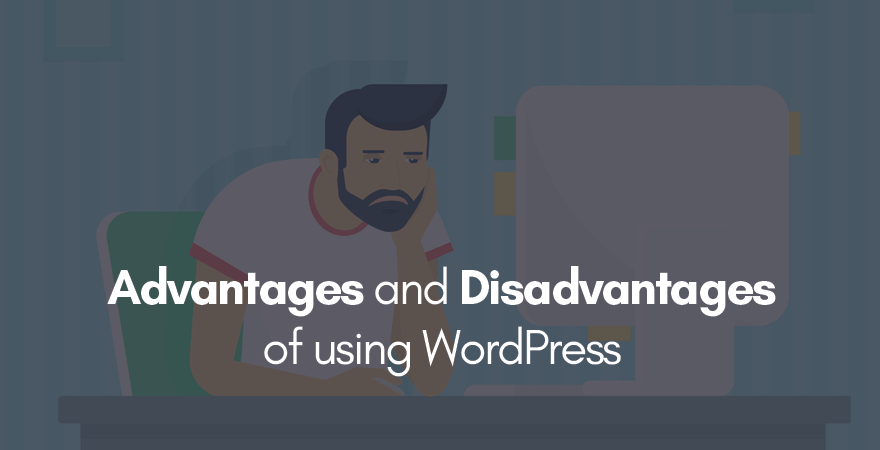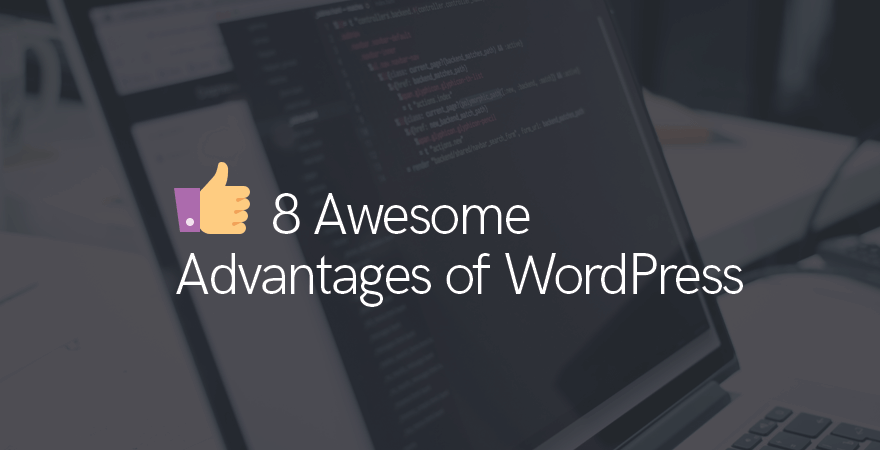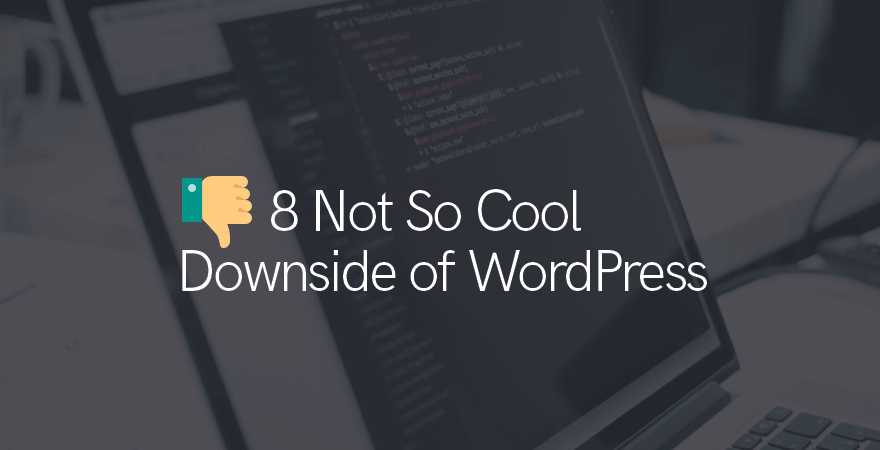
WordPress is by far the best and most convenient Content Management System (CMS), there are no second thoughts to that. It is the favorite site builder we have. It operates over well-known sites like TechCrunch, CNN, The New Yorker, MTV News to name a few. If these famous websites are on WordPress, then yours can be too.
WordPress started out as a blogging platform but soon gained momentum and is one of the best website creation tools. In short span of time, it has mastered specific capabilities and has unlocked new benefits for its users. More than one-third of the websites use WordPress for infrastructure, thus, making it world’s most famous site building platform. WordPress’ functionality and the fact that is free and open source are perhaps the most significant reason for its popularity.
Some fantastic facts about WordPress:
- 75 million sites depend on it.
- WordPress almost powers 28% of the entire websites.
- There are 37 million searches for this and related keywords per month.
- There are 45,000 plus plugins available on the official repository for free.
Astonished? Yeah, you are after going through these facts. These are not the only facts as there many, Bummer. Now, you know why people keep advising you to make your website on WordPress. You are not alone, as about 74.6 million sites depend on it.
Contents
The Advantages and Disadvantages of WordPress
There are always two sides to every story, and every coin has two sides. We all are familiar with these adages. You might be wondering why I have used them here. One simple reason WordPress has its advantages and also disadvantages.
It has paved a new way for business strategies as market facilitators, and media managers choose WordPress for the perfect way of setting up their websites due to its perceived advantages. Everyone is familiar with its pros but what about its cons. We always overlook the disadvantages of WordPress.
So, through this blog post, I am going to take you down that road which is less traveled. Jokes apart, the objective of this post is to draw the thin line between WordPress’ cons and pros and discuss in which case to go for it and in which case you should consider other alternatives. Every platform has cons and pros, and users must evaluate what they actually want and what is essential for their website.
Let us get into more detail about the advantages and disadvantages of WordPress.
Advantages of WordPress

It is an open source
WordPress is a free and open source. Therefore, many programmers and developers share their codes online that can be used by others, thereby, saving time and costs by using the existing code. It comes under the GPLv2 license that means, you can easily modify, distribute and use the code without having to pay any subscription or license fees.
Easy to operate
What really makes WordPress so easy to use is the fact that you don’t need to have any technical expertise. It is okay if you are not familiar with coding you can still create a website on WordPress. You can make changes to your site without knowing any coding. Adding new web pages, images, blogs, products, etc. You can efficiently manage your website without any external assistance. This saves you a great deal of time and money since you don’t have to pay any developer any cash for incorporating any modification also it is quite easy to install as there is no need of a high-level programmer for its setup.
After the installation too, you can easily download and install plugins right within the web GUI without having to download anything.
It’s simplicity
WordPress is simple to use just because it is free doesn’t mean that it is full of complexity. You hardly need any time in getting familiar with its concepts as it is easy to learn how to operate it. It simplifies content management and web development for the users meaning that even naive users can quickly grasp its Modus Operandi. You don’t need to have the understanding of PHP or HTML coding as it is full of rich functionality that is literally like point and click. It can be easily installed on a hosting server within a short span of time so that the Webmaster can start work instantly.
Thousands of Plugins
WordPress has over 40,000 plugins. It has Plugins primarily for every function. You want to enhance the website’s speed, and you have a plugin for it, you want to disable comments you have another one, you want to analyze your website traffic you have a specific plugin for it.
Larger developer community
The WordPress has the largest and one of its kind developers community. People from all over the world share their views and opinions with others on how can the software be made more optimal and are continually improving the software. As you have gone through the facts of WordPress, you know about its popularity. When it comes to its reputation, there is no shadow of doubt in that. Anyone can contribute to the source code that makes the platform better.
Easy to update
Once you create your website, then that’s the half job done. As with time, you may have to make sure changes and have to update your site. You can quickly update contents without writing a single line of code in WordPress. You can easily customize your website and can implement and edit without any skill.
Affordable
It is one of the cost-effective methodologies in taking your business to the online platform. It is accessible as you have to invest low but the benefits it reaps is just unreckonable. You don’t need to have any external support for using it. If you are a budget constraint or doesn’t have enough capital in developing a website, then WordPress is the platform you need to have to start the development with.
When you create a WordPress website, you significantly cut down on the investment plus the amount of time it takes to develop a site. You can quickly create a website, upload it to the server, add contents and plugins and that too, with ease.
SEO Integration
WordPress has numerous SEO plugins that can be integrated into your website. It offers several SEO tools that make your own on-site SEO simple. These plugins perform basic SEO functionality such as Meta description, Meta Title, H1 tags and much more. Some of the plugins also determine how optimized your website is and how you can enhance the website’s speed. Your site should be SEO-friendly, i.e., it should be readily available on the search engines. The easier it is to find your website the more benefits it will bring. With WordPress SEO plugins you don’t have to outsource your site to third parties for SEO as with these plugins you can manage it on your own.
Those as mentioned earlier are the benefits of WordPress. Now, let us take a look at the downside of it. As I have had said more before that every coin has two faces, therefore, we should get familiar with the disadvantages of WordPress.
After knowing the advantages of WordPress, I am, throwing some light on the overlooked topic, i.e., disadvantages of WordPress.
The Downside of WordPress:

Open Source
Open source is one of the reasons why it is famous and one of its downsides.
Since its source code is available online and is accessible by everyone, therefore, it is easy for hackers to find security glitches on your website. Your website is vulnerable to cyber attacks. The code you use has been written by one of the programmers. Therefore, it could be possible that anyone can include a malicious code into the published code and use it can hinder the standard functionality of your website and would circumvent your details.
Frequent Updates
WordPress websites require regular updates which can disrupt the functionality of the site. Upgrades are necessary to make the website more optimized and to be up to date with web browsers and mobile devices. However, after an update plugins don’t perform the way they should as plugins aren’t quick in adapting updates or don’t operate when you update the website, making your site slow and vulnerable to glitches. But you can quickly overcome it, prior to updating the site have a backup of your website so that in case, if the update is not satisfied, then it can be restored to the previous version.
Speed
As WordPress site contains lots of generic code for every specific function, therefore, at times, the loading time of your website becomes quite slow, and as you already know that the loading time is critical for your site as the faster your website is, the more users it will have and. It also enhances user experience and brings in good search engine ranking.
You are not alone
WordPress does have plenty of templates that add value to the websites. As it is popular, therefore, there is a possibility that the model your website has might be similar to other sites making it look all the same, though, the functionality is different. If you want to design a unique theme, then you need to possess the knowledge of CSS style sheet language, and that is the real problem, going in-depth of the technical aspects of the website.
Too many plugins
WordPress has lots of plugins, plugins for almost everything. While the plugins are readily available and can be easily integrated, they can slow down the response time. Installing too many of plugins can make your site slower as you put a significant amount of working hours into the project and relying too much on plugins will do more harm. Therefore, plan it in the beginning how many plugins you would need and if possible, try to avoid plugins if you can.
With time you get more advanced plugins, therefore, in order to use them deactivate previous ones and the ones that you no longer use.
Documentation
The most significant drawback of WordPress is the incomplete and inconsistent documentation and doesn’t have MS SDK document. As there are online developers communities, there is no space for offline documentation. There are also undocumented features and functions. It takes a lot of time in reviewing the source code to know if the function even exists as they don’t have a blank page in the codex.
MySQL as database backend
WordPress uses MySQL as a database backend which is susceptible to security issues and can easily be hacked. Until the 3.9 version, the private and essential data was stored on MYSQL driver, but now it uses MySQLi.
Suboptimal for SEO
You can install plugins that can help you with SEO, but it is not flexible enough to reach the performance level as that of an individually characterized website.
Concluding note
WordPress is an excellent platform for creating websites as the tool-set it offers is immense. If you aren’t tech-savvy and are the budget constraint, then WordPress might be the best pathway to follow. The benefits usually outweigh the drawbacks.
On the whole, WordPress is an excellent choice for sites that are top-down content-driven.

Leave a Reply